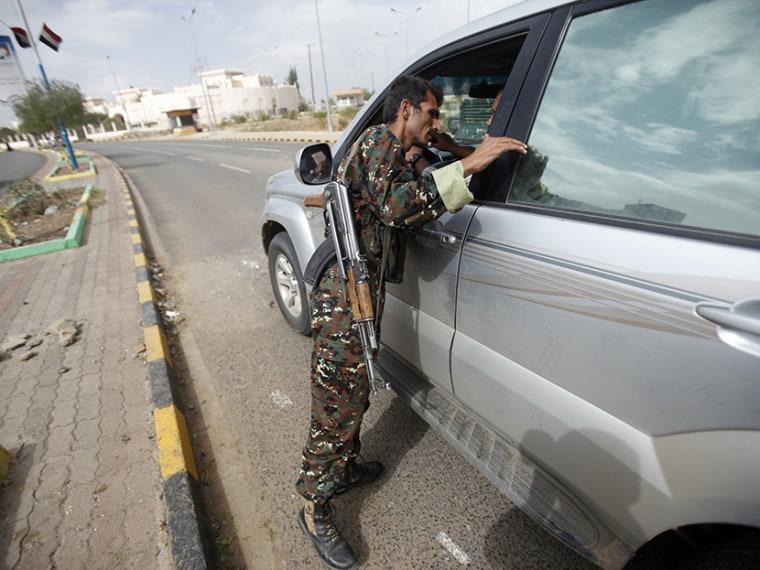Updated Aug. 6 at 10:50 p.m.
On the "Tonight Show" Tuesday night, Jay Leno asked President Leno a question on the minds of many Americans in the wake of the State Department's warning of imminent terror threats.
"This global travel warning--is this for Americans all around the world? ... What are we saying?" Leno asked.
Obama said the threat was "significant enough we're taking every precaution. We had already done a lot to bolster embassy security around the world, but especially in the Middle East, North Africa where the threats tend to be highest, and whenever we see threat stream we think is specific enough that we can take some specific precautions within a certain time frame then we do so."
"I think that the general rule is just show some common sense and some caution," Obama said. "So there's some countries where you're less likely to experience a terrorist attack. There's some that are more dangerous and, you know, if people are paying attention, checking with the State Department or embassy, going on the website before you travel and find out what kind of precautions you should be taking, then I think it still makes sense for people to take vacations. They just have to make sure that they are doing so in a prudent way."
“The odds of dying in a terrorist attack are a lot lower than they are of dying in a car accident,” he added.
Earlier Tuesday, White House spokesman Jay Carney spoke with reporters on the plane as President Obama visited Phoenix for a speech about housing.
He said the president was "briefed in real time on these matters and concurs with the decisions that have been made." Carney said: "The threat is ongoing and it's real, and we consider it serious. We believe that it will--that it is occurring in or emanating from the Arabian Peninsula, but we obviously cannot rule anything out when it comes to how the threat might manifest itself."
Citing a potential al Qaeda terrorist threat, particularly in the Middle East and North Africa, the U.S. shuttered dozens of its Middle East embassies--a number of which remain closed--and issued a worldwide travel alert for Americans Friday. The State Dept. said the attacks may be planned to take place before the end of the month (the holy month of Ramadan ends Wednesday), and information suggested it could "possibly [be] occurring in or emanating from the Arabian Peninsula."
On Tuesday the State Department urged all U.S. citizens to defer any planned travel to Yemen as it warned of a "high security threat level." It also ordered non-emergency U.S. personnel to leave the country and a reduction in emergency staff. Nearly 100 U.S. government workers were flown out of the country Tuesday as the State Dept. continued to warn of increased terror threats in the region, NBC News reported.
State Department spokesperson Jen Psaki said that the reduction of staff at the U.S. embassy in Yemen was done in "response to an immediate specific threat"--not a new threat, but based on "a constant evaluation of new information" that U.S. intelligence agencies have received on the existing threat that caused the U.S. to temporarily close nearly two dozen embassies and diplomatic posts in the Middle East and North Africa last week.
The threat warning was set off after U.S. officials intercepted communication between al Qaeda’s leader, Ayman al Zawahiri (Osama bin Laden's successor), and the head of AQAP, the Yemen al Qaeda affiliate, Nasir al Wahisi, intelligence sources told NBC News.
Reports also said a drone strike killed several suspected al Qaeda members in Yemen on Tuesday.
On Monday, NBC's chief foreign correspondent Richard Engel said, “We know that al Qaeda in the Arabian Peninsula has some very dangerous, very important leaders who are tied directly to the top leadership of al Qaeda central, including a man who was formerly Osama bin Laden's secretary. We know that there was chatter.”
“But we don't know the most important things: exactly where, exactly when. So we've seen a blanket response in much of the Muslim world,” he added.
The State Department reiterated at its Monday briefing that the embassy closures were done “out of an abundance of caution” and denied any connection to recent prison breaks that freed more than 2,000 inmates in Iraq, Libya, and Pakistan.
"These prison breaks are obviously a concern for the international community writ large…but that is separate and apart, I think, from our concern about the specific threat," State Department spokesperson Marie Harf said Monday.
The issue of embassy security entered into the public discourse last September after four Americans, including Ambassador Chris Stevens, died during an attack on the U.S. mission in Benghazi, Libya.
"They’re obviously erring on the side of caution, closing down a lot of these missions which is very disruptive, of course, to any embassy's ability to sort of get out and see what's going on in the country,” said Chris Hill, former Ambassador to Iraq, Monday on Andrea Mitchell Reports.
Reporting contributed by NBC's Courtney Kube and Catherine Chomiak
